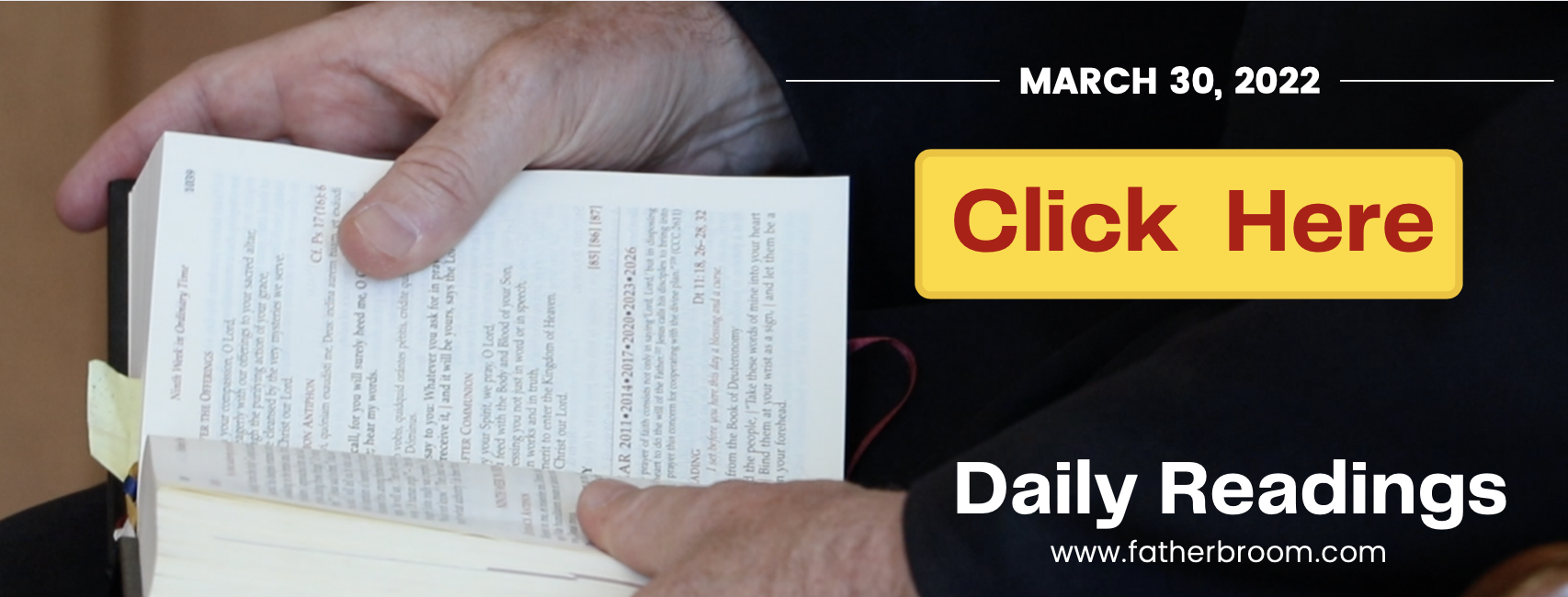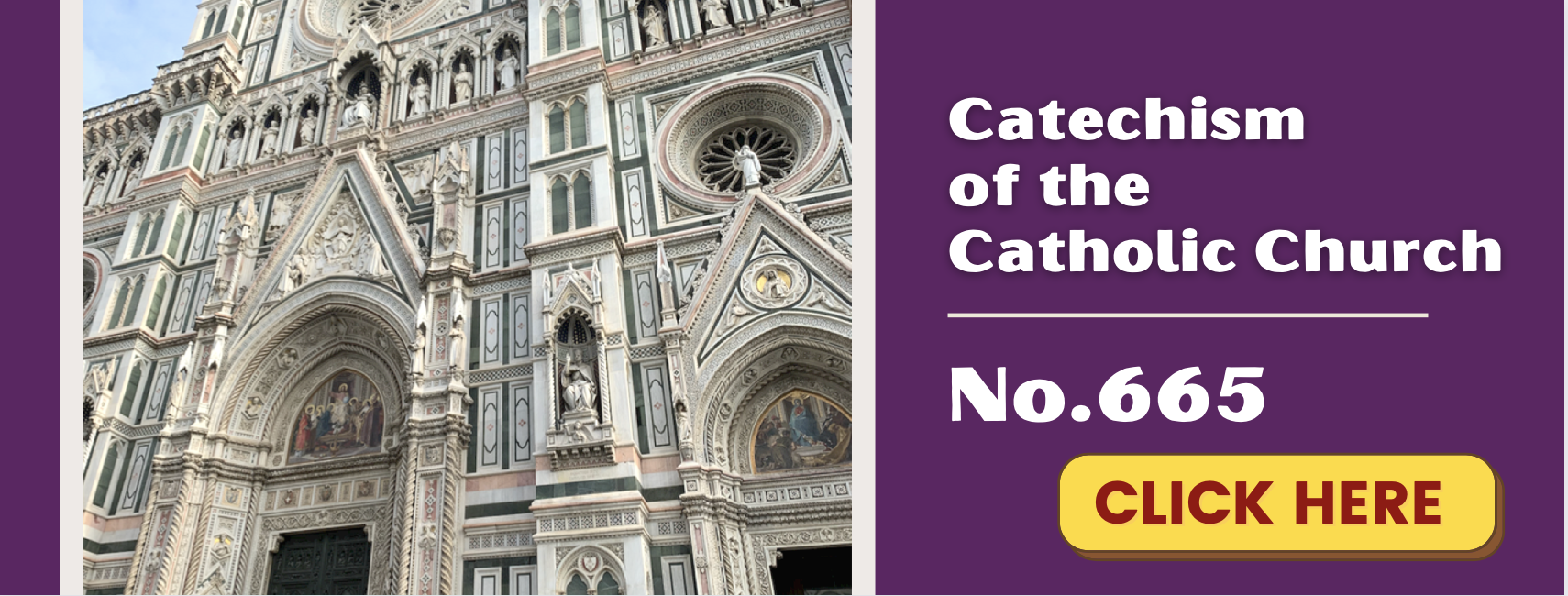Wednesday of the Fourth Week of Lent



“For greater things you were born.” (Ven. Mother Luisita)
WEDNESDAY, March 30TH Jn. 5:17-30 Verse before the Gospel “I am the resurrection and the life, says the Lord; whoever believes in me will never die.”
Catechism of the Catholic Church:
1324: The Eucharist is “the source and summit of the Christian life.” “The other sacraments, and indeed all ecclesiastical ministries and works of the apostolate, are bound up with the Eucharist and are oriented toward it. For in the blessed Eucharist is contained the whole spiritual good of the Church, namely Christ himself, our Pasch.”
Quotes from St. Maximilian Kolbe:
“God dwells in our midst, in the Blessed Sacrament of the altar.”
“He remains among us until the end of the world. He dwells on so many altars, though so often offended and profaned.”
“The culmination of the Mass is not the consecration, but Communion.”
“Lord, you come to me and unite Yourself intimately to me under the form of nourishment. Your Blood now runs in mine, Your Soul, Incarnate God, compenetrates mine, giving courage and support. What miracles! Who would have ever imagined such!”
“If angels could be jealous of men, they would be so for one reason: Holy Communion.”
BREAD OF LIFE AND THE GATE TO OUR SALVATION by Fr. Ed Broom, OMV
PRINCIPLE AND FOUNDATION. St. Ignatius of Loyola gives us his fundamental and essential reflection on the purpose of our existence in “Principle and Foundation (#23 Spiritual Exercises): “Man is created to praise God, reverence God, serve God and by means of that to save his soul.” Put succinctly: Man is to praise the Triune God and to save his immortal soul.
This being the case, we should utilize the most efficacious means to arrive at our eternal salvation—that is to say: to get to heaven. Take this analogy: means of transportation. If you wanted to travel from Los Angeles to New York, you could use various means of transportation: walk, skateboard, bike, car, Jet-Plane. Obviously, the Jet-Plane is the quickest and most efficacious means of transportation. Therefore, if we are seeking the quickest and most efficacious means to wing our way to heaven, Jesus gave us the Bread of Life Discourse. (Jn 6:25-59)
Jesus teaches with utmost clarity that for us to live we must eat, we must nourish ourselves, but most especially, nourish our immortal souls. Jesus teaches: “I am the Bread of life. Whoever eats my Body and drinks my Blood will have eternal life and I will raise him up on the last day.” (Jn 6:35, 56) Jesus repeats this message time and time again emphasizing the supreme importance of this gesture.
MEANING. Let us spell out the meaning with great clarity. For us to attain and live out Principle and Foundation and achieve eternal salvation, we must go to Mass, participate in Holy Mass, and receive Jesus, the Bread of Life faithfully, frequently and fervently.
SACRAMENTAL THEOLOGY: DISPOSITIVE GRACE. Sacramental Theology teaches clearly that the Eucharist is God and has infinite value and grace because it is Jesus Himself. However, the graces received by each individual person depends upon their disposition of soul. Such that one could even be receiving the Body of Christ to the detriment of their soul or even to their own condemnation as expressed in the Letter of St. Paul to the Corinthians. (1Cor 11:17-34)
Therefore, let us offer a few concrete suggestions to help us during the course of our lives to upgrade our reception of Holy Communion. Let us always strive to receive Jesus, the Bread of Life, with greater faith, fervor and frequency such that Holy Communion will transform us into saints; in the words of St. Paul: “It is no longer I who live, but Christ who lives in me.” (Gal 2:20)
CONCRETE PRACTICES TO IMPROVE OUR RECEPTION OF HOLY COMMUNION
1. CONFESSION. If we clean our windows with WINDEX, then the light of the sun can penetrate and permeate with light the whole room. So it is with our soul; the cleaner and more pure the soul, the more abundant will be the light, peace and joy that will inundate our souls upon the reception of Holy Communion. Make good confessions and your Communions will become more fruitful.
2. COME EARLY BEFORE MASS. None of us would arrive late for a World Series game, a Graduation Ceremony, or to receive the winnings of a Lotto ticket of ten million dollars. But we can easily slip and slide into Mass five to ten minutes late. By doing so we disturb the Mass, the priest, and we will ourselves will be distracted the whole Mass.
3. INTENTIONS. The Parish priest has his intention for the Mass—a living or deceased person in a family. However, you can offer your own intentions in every Mass. In theology, this is called living out the Common Priesthood of the faithful. The book of Hebrews in the Bible defines the priest as the person who goes before God and offers gifts and sacrifices in reparation for sins. What are some intentions you might offer? Limitless! However, three could be very pleasing to God.
a) THE DECEASED/ THE SOULS IN PURGATORY. The souls in Purgatory are saved. However, they need our prayers, sacrifices, and especially Masses and Communions to purify their souls so they can have access to heaven. Then, in gratitude, they will pray for you!
b) CONVERSION OF SINNERS (FAMILY MEMBERS). We all have in mind many of our loved ones who have drifted away from God and whose eternal salvation is in jeopardy. Offer up your Masses and Holy Communions so that these lost sheep, these prodigal sons and daughters will return.
c) PERSONAL HEART-TRANSPLANT. We are all in need of our own personal conversion. Why not, upon receiving Holy Communion, beg for a transformation of your life. Let Holy Communion become your own personal Heart-transplant. No better way to become like Jesus than to receive Him into your very heart in Holy Communion.
4. RECEIVE HOLY COMMUNION THROUGH THE IMMACULATE HEART OF MARY. St. Mother Teresa of Calcutta offers this prayer: “Immaculate Heart of Mary, give me your Heart, so that I can love more fully the Heart of Jesus.” If we receive Holy Communion through the Heart of Mary, then Jesus will be received with the best of dispositions and with great love.
5. THANKSGIVING. When invited to a meal, we do not eat and run. That would be rude. Rather, we stay, we linger for not only do we enjoy the food, but even more the company! Likewise, the Eucharist is the Sacrifice of Calvary renewed, but also the Eucharist is in the context of a Sacred Meal. After Mass, spend some time in thanksgiving. Actually, the word Eucharist means Thanksgiving. In the words of the Psalmist: “Give thanks to the Lord for He is good; His mercy endures forever.” (Ps 136:1) Spend quality time thanking, praising, worshiping, and loving the Lord. These moments after receiving Holy Communion are the most precious in all of our days until our next Holy Communion!
A MODEL FOR US. St. Charbel Makhlouf who was a Lebanese Maronite monk can serve as a model and powerful example for us. This holy man of God knew the source and summit of his holiness: Mass and Holy Communion. In his monastery, St. Charbel was given permission to celebrate the Holy Sacrifice of the Mass at 12 noon. The reason for this midday Mass? St. Charbel ardently desired to spend all of the morning in preparation for Holy Mass; then after Mass and Holy Communion, he strove to spend the rest of the day, evening and night—in praising and thanking Jesus for Mass and Holy Communion.
Let us all starting now make a concerted effort to prepare our hearts for Mass, to participate fully, actively and consciously in Mass, and make excellent thanksgivings after Mass. If done, Jesus’ promise is sublime: eternal life! Jesus, the Bread of Life and our Savior and Redeemer, stated unequivocally: “I am the Bread of Life. Whoever eats my Body and drinks my Blood will have eternal life and I will raise Him up on the last day.” (Jn 6:35, 58) Let us not walk, skateboard, bike, or even drive on our way to eternal life. Let us soar and sky-rocket our way through the clouds by frequent, faith-filled, fiery and fervent receptions of Holy Communion—Jesus, the Bread of Life!